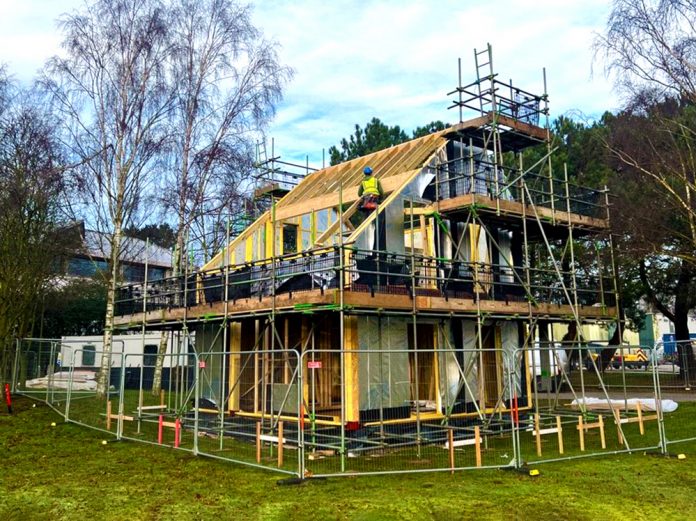The University of Suffolk has started construction on an ‘EcoLab’ at BT’s Adastral Park.
The EcoLab is a collaborative, research facility that aims to demonstrate the regional capacity for the design, build and occupation of sustainable homes.
Partners in the project include the New Anglia Local Enterprise Partnership and BT. The EcoLab forms part of the LEP’s investment in the new DigiTech Centre, supported by its Growth Deal with Government.
The initial targets for the brief are to achieve zero carbon occupancy; a reduction in embodied carbon of around 50% compared to a typical brick and block-house; and to construct the building using the latest construction methods.
In the longer term, the completed build will utilise smart systems to evaluate the performance of sustainable materials, low carbon energy and water consumption. This is coupled with critical consideration of the wider landscape through ecological design.
Benjamin Powell, Lecturer in Architecture at the University of Suffolk, said: “The project brief was to address two of the most pressing concerns that we face; climate change, and the impact the construction industry has on this; and the UK housing crisis, which sees the chronic shortage of affordable housing.
“This first stage of the project will see a finished two-bed home that achieves a zero-carbon occupancy and a 50% reduction in embodied carbon. At the same time, this is being developed through a model that can be built out at scale whilst achieving very significant savings in construction costs over similarly minded low energy schemes.
“We believe this is a fundamental requirement of making a low energy future attainable to all and, therefore, attainable at all.”
Chris Starkie, Chief Executive of New Anglia Local Enterprise Partnership, added: “Testing greener construction methods and materials is vital if we are to develop the clean growth skills which our region needs to support the transition to net zero. I’m looking forward to seeing the new sustainable technologies and innovative ideas which are developed and tested as part of this project.”
The EcoLab at Adastral Park is due to be completed in April.





